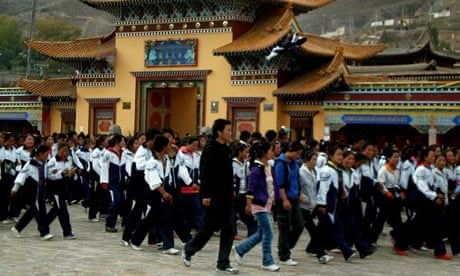Protests by Tibetan students in western China over plans to restrict the use of their language have spread, according to state media and a campaign group.
A source in Beijing said between 200 and 300 Tibetan students at the capital's Central University for Nationalities held a peaceful demonstration this afternoon.
It ended after the head of the university and other officials took them to classrooms and told them to write down their complaints, he added.
The protests began when at least 1,000 teenagers took to the streets in Rebkong, also known as Tongren, in Qinghai province on Tuesday.
The following day, thousands more demonstrated in parts of the western province, the Free Tibet group said.
In Chabcha county, also known as Gonghe, about 2,000 students from four schools demonstrated, shouting: "We want freedom for Tibetan language," said Free Tibet. It also said middle school pupils protested in Tsigorthang county, also known as Xinghai.
In Tawo, also known as Dawu, students protested from sunrise. Authorities later stopped people going on to the streets, the group added.
The English-language Global Times newspaper said students had taken to the streets of "several" Tibetan regions in Qinghai, citing a Tongren county spokesman and a Gonghe resident.
Such demonstrations are rare, despite long-running concerns that the Tibetan language is being marginalised by the authorities, although Tibetan areas in provinces such as Qinghai are governed less strictly than the autonomous region.
The protests were sparked by an order that all lessons and textbooks should be in Chinese in primary schools by 2015, with the exception of Tibetan language and English classes.
China says it has a bilingual education system in Tibetan areas and that promoting Mandarin helps young Tibetans to integrate into broader Chinese society and find better jobs.
But many Tibetans complain that their culture is being eroded and fear Tibetan teachers will lose their jobs because of the new rules. The friction reflects wider anger at controls on their culture and religion.
Robert Barnett, director of the modern Tibetan studies programme at Columbia University, said student demonstrations seemed to have developed in the past couple of years and that the involvement of school pupils rather than older students was new.
"Students have occasionally taken their chance to speak out. There's a little space in Chinese society in schools and in universities that Tibetans are exploring," he said.
"The state doesn't seem to overreact with them in the way it does with villagers or monks."
Barnett said students had held several peaceful protests during the unrest of March 2008 and small rallies earlier this year.
Xiong Kunxin, a professor of ethnic policy studies at Minzu University of China, told the Global Times that promoting standard Chinese would help people integrate into mainstream society.
"Some local people might have misunderstood the goodwill," he said.
He added that local authorities should conduct more research and listen to residents' opinions before implementing language policies.
